In this e-weekly:
- Reasons Why People Think Catholics Are "Crazy" (A bit of humor… [the smiling cat])
- Knights of Columbus Assure Ukrainians: You are Not Alone (Diocesan News and BEYOND)
- Guidlines on Charitable Giving from the Bishops of North Dakota (Helpful Hints for Life)
- Reasons Why People Think Catholics Are "Crazy" (A bit of humor… [the smiling cat])
- Knights of Columbus Assure Ukrainians: You are Not Alone (Diocesan News and BEYOND)
- Guidlines on Charitable Giving from the Bishops of North Dakota (Helpful Hints for Life)
Catholic Good News
Receiving the Gospel, Serving God and Neighbor
Prayer, Fasting, and ALMSGIVING
“When you give alms, do not blow a trumpet before you, as the hypocrites do in the synagogues and in the streets to win the praise of others. Amen, I say to you, they have received their reward. But when you give alms, do not let your left hand know what your right is doing, so that your almsgiving may be secret. And your Father who sees in secret will repay you.” -Matthew 6:2-4
Dear friends in Christ Jesus,
Money. It is where the rubber meets the road in the Christian Life. It is perhaps the most true idol today that we might put in the place of God. We would not say that we have money as an idol, but what do our actions tell?
We can control and see the effects of prayer and fasting, but we do not have this advantage with almsgiving. We have no idea what will be done with our alms, or if we will have needed them ourselves, or if we should have given alms at all. We must TRUST GOD, and that is perhaps the hardest thing to do. But that is exactly what almsgiving is meant to help us to do.
“No servant can serve two masters. He will either hate one and love the other, or be devoted to one and despise the other. You cannot serve God and (money) mammon. Matthew 6:24 and Luke 16:13" [God has given us all, what do we give back to Him via the Church and the poor?]
This Lent we have been striving to embrace Prayer, Fasting, and Almsgiving to bring about true change in our lives. Add this final member of the triumvirate and let God change your heart and life into something wonderful you never even imaged!
Peace and prayers in Jesus through Mary, loved by Saint Joseph,
Father Robert
P.S. This coming Sunday is the Third Sunday of Lent. The readings can be found at: https://bible.usccb.org/bible/readings/031223.cfm
P.S.S. Outline of homily on Almsgiving is found at the end of this e-weekly.
Money. It is where the rubber meets the road in the Christian Life. It is perhaps the most true idol today that we might put in the place of God. We would not say that we have money as an idol, but what do our actions tell?
We can control and see the effects of prayer and fasting, but we do not have this advantage with almsgiving. We have no idea what will be done with our alms, or if we will have needed them ourselves, or if we should have given alms at all. We must TRUST GOD, and that is perhaps the hardest thing to do. But that is exactly what almsgiving is meant to help us to do.
“No servant can serve two masters. He will either hate one and love the other, or be devoted to one and despise the other. You cannot serve God and (money) mammon. Matthew 6:24 and Luke 16:13" [God has given us all, what do we give back to Him via the Church and the poor?]
This Lent we have been striving to embrace Prayer, Fasting, and Almsgiving to bring about true change in our lives. Add this final member of the triumvirate and let God change your heart and life into something wonderful you never even imaged!
Peace and prayers in Jesus through Mary, loved by Saint Joseph,
Father Robert
P.S. This coming Sunday is the Third Sunday of Lent. The readings can be found at: https://bible.usccb.org/bible/readings/031223.cfm
P.S.S. Outline of homily on Almsgiving is found at the end of this e-weekly.
Catholic Terms of the Week
Term Review
almsgiving (from Greek eleEmOn “merciful”)
- something given freely in charity to assist those in need and to relieve the poor.
[Almsgiving, together with prayer and fasting, are traditionally recommended to foster the state of interior penance.]
almsgiving (from Greek eleEmOn “merciful”)
- something given freely in charity to assist those in need and to relieve the poor.
[Almsgiving, together with prayer and fasting, are traditionally recommended to foster the state of interior penance.]
“Helpful Hints of Life”
Guidance on Charitable Giving from the Bishops of North Dakotaby
Bishop Samuel J. Aquila, D.D., Bishop Paul A. Zipfel
Guidance on Charitable Giving from the Bishops of North Dakotaby
Bishop Samuel J. Aquila, D.D., Bishop Paul A. Zipfel
Catholics are compelled by the Gospel to responsibly promote the protection of human life, families, and the common good. We applaud the charitable giving and social justice efforts of our parishes, Catholic schools, and individuals. At the same time, we urge attentiveness to the possibility of endorsing an organization whose mission or affiliation may be morally objectionable or, at least, questionable. We call upon pastors, clergy, and the lay faithful to use guidelines based on the virtue of prudence and justice when making charitable giving decisions.
Church teaching: All human life is sacred and must be protected. This is why we should not support or endorse individuals and organizations that provide, promote, or advocate for abortion, contraception, “reproductive rights/ family planning,” or embryonic stem cell research. Marriage, a lifelong partnership between a man and a woman, is the foundation of the family and, therefore, essential to the common good. Accordingly, we should not support individuals and organizations that seek to redefine marriage or whose activities devalue its importance.
Guidelines: When evaluating the appropriateness of participating in, publicizing, or otherwise providing support to a fundraising effort, Catholic entities should consider whether the mission and activities of the organization are consistent with Catholic teaching, particularly as it pertains to human life and marriage. Church facilities should not be used to promote, endorse, or fundraise for such organizations if their policies are contrary to Church teaching.
We take this opportunity to mention certain organizations that Catholic entities should not support.
American Association of University Women: AAUW's stated mission is to advance “equity for women and girls through advocacy, education, philanthropy, and research” and often provides local scholarships with money raised through book fairs. AAUW, however, strongly supports abortion rights and same-sex “marriage,” and opposes parental choice in education.
Amnesty International: In 2007, Amnesty International abandoned its neutral stance on abortion and adopted a pro-abortion position.
Crop Walk/Church World Service: CROP Walk, an annual hunger awareness and fundraising effort that benefits many local food pantries, is sponsored by Church World Service (CWS), an agency of the National Council of Churches. Catholic Relief Services withdrew its name from the list of funding recipients since some of the partners of CWS support the provision of contraceptives in their overseas missions and programs and CRS could not guarantee that donations, particularly Catholic donors who have earmarked their contribution to those efforts consistent with Church teaching, would not be utilized for objectionable services.
March of Dimes: The March of Dimes' focus is the prevention of birth defects, premature birth, and infant mortality. March of Dimes, however, also supports embryonic stem cell research, preimplantation diagnosis for untreatable conditions, and mandatory contraceptive coverage for insurance plans.
Susan G. Komen for the Cure: This anti-breast cancer organization is known for its “Race for the Cure” fundraising activities (not to be confused with “Relay for Life.”) Money raised at these events has gone to Planned Parenthood and the organization refuses to acknowledge the link between abortion and breast cancer.
UNICEF: The Holy See suspended an annual symbolic contribution in 1996 due to the “shift in UNICEF activities” that were once solely focused on child welfare but now includes contraceptive and abortion services.
†Most Rev. Paul A. Zipfel
Bishop of Bismarck
†Most Rev. Samuel J. Aquila
Bishop of Fargo
“Many of Jesus' deeds and words constituted a "sign of contradiction", but more so for the religious authorities in Jerusalem, whom the Gospel according to John often calls simply "the Jews", than for the ordinary People of God. To be sure, Christ's relations with the Pharisees were not exclusively polemical. Some Pharisees warn him of the danger he was courting; Jesus praises some of them, like the scribe of Mark 12:34, and dines several times at their homes. Jesus endorses some of the teachings imparted by this religious elite of God's people: the resurrection of the dead, certain forms of piety (almsgiving, fasting and prayer), the custom of addressing God as Father, and the centrality of the commandment to love God and neighbor.”
Catechism of the Catholic Church #575
Church teaching: All human life is sacred and must be protected. This is why we should not support or endorse individuals and organizations that provide, promote, or advocate for abortion, contraception, “reproductive rights/ family planning,” or embryonic stem cell research. Marriage, a lifelong partnership between a man and a woman, is the foundation of the family and, therefore, essential to the common good. Accordingly, we should not support individuals and organizations that seek to redefine marriage or whose activities devalue its importance.
Guidelines: When evaluating the appropriateness of participating in, publicizing, or otherwise providing support to a fundraising effort, Catholic entities should consider whether the mission and activities of the organization are consistent with Catholic teaching, particularly as it pertains to human life and marriage. Church facilities should not be used to promote, endorse, or fundraise for such organizations if their policies are contrary to Church teaching.
We take this opportunity to mention certain organizations that Catholic entities should not support.
American Association of University Women: AAUW's stated mission is to advance “equity for women and girls through advocacy, education, philanthropy, and research” and often provides local scholarships with money raised through book fairs. AAUW, however, strongly supports abortion rights and same-sex “marriage,” and opposes parental choice in education.
Amnesty International: In 2007, Amnesty International abandoned its neutral stance on abortion and adopted a pro-abortion position.
Crop Walk/Church World Service: CROP Walk, an annual hunger awareness and fundraising effort that benefits many local food pantries, is sponsored by Church World Service (CWS), an agency of the National Council of Churches. Catholic Relief Services withdrew its name from the list of funding recipients since some of the partners of CWS support the provision of contraceptives in their overseas missions and programs and CRS could not guarantee that donations, particularly Catholic donors who have earmarked their contribution to those efforts consistent with Church teaching, would not be utilized for objectionable services.
March of Dimes: The March of Dimes' focus is the prevention of birth defects, premature birth, and infant mortality. March of Dimes, however, also supports embryonic stem cell research, preimplantation diagnosis for untreatable conditions, and mandatory contraceptive coverage for insurance plans.
Susan G. Komen for the Cure: This anti-breast cancer organization is known for its “Race for the Cure” fundraising activities (not to be confused with “Relay for Life.”) Money raised at these events has gone to Planned Parenthood and the organization refuses to acknowledge the link between abortion and breast cancer.
UNICEF: The Holy See suspended an annual symbolic contribution in 1996 due to the “shift in UNICEF activities” that were once solely focused on child welfare but now includes contraceptive and abortion services.
†Most Rev. Paul A. Zipfel
Bishop of Bismarck
†Most Rev. Samuel J. Aquila
Bishop of Fargo
“Many of Jesus' deeds and words constituted a "sign of contradiction", but more so for the religious authorities in Jerusalem, whom the Gospel according to John often calls simply "the Jews", than for the ordinary People of God. To be sure, Christ's relations with the Pharisees were not exclusively polemical. Some Pharisees warn him of the danger he was courting; Jesus praises some of them, like the scribe of Mark 12:34, and dines several times at their homes. Jesus endorses some of the teachings imparted by this religious elite of God's people: the resurrection of the dead, certain forms of piety (almsgiving, fasting and prayer), the custom of addressing God as Father, and the centrality of the commandment to love God and neighbor.”
Catechism of the Catholic Church #575
Catholic Principals of Tithing
http://www.saint-mike.org/Library/Rule/Excerpts/Principles_Tithing.html
These are guidelines and suggestions to assist one in making a return to the Lord for all that He has given us. These tell the why and how of supporting the material needs of the Church which all Catholic are to do and of assist those in need.
http://www.saint-mike.org/Library/Rule/Excerpts/Principles_Tithing.html
These are guidelines and suggestions to assist one in making a return to the Lord for all that He has given us. These tell the why and how of supporting the material needs of the Church which all Catholic are to do and of assist those in need.
The Knights of Columbus are no strangers to stepping up with abundant aid in desperate situations. The war in Ukraine is no exception. This past year, the fraternal organization has stepped forward boldly with continuing aid in the war-torn country.
Supreme Knight Patrick Kelly shared some of what he observed and how the Knights are bringing aid to Ukraine with Register staff writer Joseph Pronechen in an email interview Feb. 24, marking the one year anniversary since the invasion.
Please share some of your experiences visiting Ukraine and Poland: What particular things have been most moving?
I visited Ukraine and Poland twice in 2022, beginning with a trip during Holy Week.
I saw tremendous suffering, and I saw real strength. Both trips were deeply moving.
The number of refugees and displaced persons, as well as the conditions they faced, were striking. I was watching people walk across the border, mostly women and children, with nothing more than a small suitcase. They would stop at our K of C Mercy Center for warmth, something to eat and to get some rest — both physical and spiritual. Often, there would be a priest or religious sister present. They didn’t know where they would go next, and our volunteers helped connect them with resources. I saw people living in a previously abandoned monastery in Ukraine, again with very little, in terms of material goods and a great deal of uncertainty. I saw separated families, and I heard the stories of lost loved ones.
But I also saw something inspiring and just as moving — the patriotism of one nation in crisis and another nation stepping bravely forward to assist in an hour of need. In Ukraine and Poland, I saw real solidarity, which is remarkable, given the history of the region. So I was saddened and inspired. But, overall, I was even more convinced of the importance of our humanitarian support.
Who were some of the others you met with while there?
Throughout both trips, my message was one of solidarity and a commitment of continued support.
In December, I met with government officials, prominent Catholic leaders from both the Latin and Ukrainian Greek Churches, and local Knights. I also spent time with displaced Ukrainians — just hearing their stories. These stories were heart-wrenching, but I was also able to see what a concrete difference our humanitarian aid is making for real people. Lives depend on it.
I met with President Andrzej Duda of Poland. President Duda and I both recognize that while much has been accomplished, the relief work must continue for the long term. I assured President Duda of the Knights’ commitment to ongoing support.
And this support needs to include some more long-term solutions as well as immediate aid. So I was especially proud to visit Our Lady of Częstochowa parish in Radom, Poland, where we opened the Blessed Michael McGivney House, a new long-term resource center for refugees. We will need more of these kinds of resources; and the Knights — in Poland, Ukraine and around the world — are committed to providing them.
What are some of the ways Knights have been helping the people in Ukraine — Knights from the U.S., Knights in Poland? How are needs being answered?
Well, first and foremost, by raising money and getting immediate aid to people on the ground. Within 36 hours of the Russian invasion, the Knights of Columbus committed $1.5 million toward humanitarian relief and established the Ukraine Solidarity Fund. To date, the Knights have raised more than $20 million.
Less than a week after the invasion began, we began organizing our K of C Charity Convoys — truckloads of supplies, which our members brought into Ukraine.
The Knights also established Mercy Centers along the Poland-Ukraine border that served more than 300,000 people.
More recently, we began the “Powering Our Parishes” program to provide generators, especially important in the winter, as power plants have been increasingly targeted. We’re sending these generators to parishes in Ukraine, so that they can provide centers for warmth and for community, in addition to keeping the churches themselves running.
We’ve also partnered with other organizations to magnify our help, calling upon their particular areas of expertise. With these partners, we’ve provided health care to civilians, and we’re underway with a project to remove mines from fields and waterways, so that people can return to their liberated lands and restore some semblance of normal life. We’ve worked with other groups to build orphanages and provide for the education of Ukrainian children.
Supreme Knight Patrick Kelly shared some of what he observed and how the Knights are bringing aid to Ukraine with Register staff writer Joseph Pronechen in an email interview Feb. 24, marking the one year anniversary since the invasion.
Please share some of your experiences visiting Ukraine and Poland: What particular things have been most moving?
I visited Ukraine and Poland twice in 2022, beginning with a trip during Holy Week.
I saw tremendous suffering, and I saw real strength. Both trips were deeply moving.
The number of refugees and displaced persons, as well as the conditions they faced, were striking. I was watching people walk across the border, mostly women and children, with nothing more than a small suitcase. They would stop at our K of C Mercy Center for warmth, something to eat and to get some rest — both physical and spiritual. Often, there would be a priest or religious sister present. They didn’t know where they would go next, and our volunteers helped connect them with resources. I saw people living in a previously abandoned monastery in Ukraine, again with very little, in terms of material goods and a great deal of uncertainty. I saw separated families, and I heard the stories of lost loved ones.
But I also saw something inspiring and just as moving — the patriotism of one nation in crisis and another nation stepping bravely forward to assist in an hour of need. In Ukraine and Poland, I saw real solidarity, which is remarkable, given the history of the region. So I was saddened and inspired. But, overall, I was even more convinced of the importance of our humanitarian support.
Who were some of the others you met with while there?
Throughout both trips, my message was one of solidarity and a commitment of continued support.
In December, I met with government officials, prominent Catholic leaders from both the Latin and Ukrainian Greek Churches, and local Knights. I also spent time with displaced Ukrainians — just hearing their stories. These stories were heart-wrenching, but I was also able to see what a concrete difference our humanitarian aid is making for real people. Lives depend on it.
I met with President Andrzej Duda of Poland. President Duda and I both recognize that while much has been accomplished, the relief work must continue for the long term. I assured President Duda of the Knights’ commitment to ongoing support.
And this support needs to include some more long-term solutions as well as immediate aid. So I was especially proud to visit Our Lady of Częstochowa parish in Radom, Poland, where we opened the Blessed Michael McGivney House, a new long-term resource center for refugees. We will need more of these kinds of resources; and the Knights — in Poland, Ukraine and around the world — are committed to providing them.
What are some of the ways Knights have been helping the people in Ukraine — Knights from the U.S., Knights in Poland? How are needs being answered?
Well, first and foremost, by raising money and getting immediate aid to people on the ground. Within 36 hours of the Russian invasion, the Knights of Columbus committed $1.5 million toward humanitarian relief and established the Ukraine Solidarity Fund. To date, the Knights have raised more than $20 million.
Less than a week after the invasion began, we began organizing our K of C Charity Convoys — truckloads of supplies, which our members brought into Ukraine.
The Knights also established Mercy Centers along the Poland-Ukraine border that served more than 300,000 people.
More recently, we began the “Powering Our Parishes” program to provide generators, especially important in the winter, as power plants have been increasingly targeted. We’re sending these generators to parishes in Ukraine, so that they can provide centers for warmth and for community, in addition to keeping the churches themselves running.
We’ve also partnered with other organizations to magnify our help, calling upon their particular areas of expertise. With these partners, we’ve provided health care to civilians, and we’re underway with a project to remove mines from fields and waterways, so that people can return to their liberated lands and restore some semblance of normal life. We’ve worked with other groups to build orphanages and provide for the education of Ukrainian children.
Since Knights always bring spiritual support into all of their efforts, can you share some thoughts on this aspect from your trips?
I think something that is sometimes overlooked — but that from a Catholic perspective is just as important as our material aid — is our spiritual support. As the Polish people once said to John Paul II in a different time, but also a time of great suffering and trial: “We want God.”
While in Ukraine, I was invited to attend a vespers service with Ukrainian Greek Catholic seminarians and to offer a few words. I told them I thought they were among the most important future leaders of Ukraine because they are to be, principally, witnesses to the faith. It is faith in Jesus Christ that can ground the culture of Ukraine and can carry it through these dark times. But even more than that, it’s a witness to the whole world that the answer to the problems we face is Jesus Christ. Knights around the world are praying regularly for the people of Ukraine and for a just end to the war.
While in Ukraine, I was invited to attend a vespers service with Ukrainian Greek Catholic seminarians and to offer a few words. I told them I thought they were among the most important future leaders of Ukraine because they are to be, principally, witnesses to the faith. It is faith in Jesus Christ that can ground the culture of Ukraine and can carry it through these dark times. But even more than that, it’s a witness to the whole world that the answer to the problems we face is Jesus Christ. Knights around the world are praying regularly for the people of Ukraine and for a just end to the war.
Are there Knights in Ukraine?
We have more than 2,000 Knights in Ukraine, and that includes more than 140 who joined our ranks during the war. We also have more than 7,200 Knights across the border in Poland. So we are uniquely suited to help. We’re not an aid agency. But we are part of the affected communities.
Through our Knights in Ukraine, we get real-time information on what is needed at any given moment. This allows us to continually adapt our aid to the changing circumstances.
More importantly, this war impacts our families. And that’s why we’re not going anywhere. That is why I can say with confidence to the Ukrainians, “You’re not alone.” That is why I promised to them that we’ll be there for the long haul.
Through our Knights in Ukraine, we get real-time information on what is needed at any given moment. This allows us to continually adapt our aid to the changing circumstances.
More importantly, this war impacts our families. And that’s why we’re not going anywhere. That is why I can say with confidence to the Ukrainians, “You’re not alone.” That is why I promised to them that we’ll be there for the long haul.
Are the Knights continuing to make this aid a priority?
Knights in Ukraine, Poland and around the world have made our response to the humanitarian needs of those impacted by the invasion a priority since Day One. We continually ask our members to pray for those affected by the war and to support our relief efforts through the Ukraine Solidarity Fund.
We hope to bring renewed attention to the humanitarian crisis in the region through our upcoming documentary In Solidarity With Ukraine, which will air on ABC network affiliates across the United States for six consecutive weekends, beginning Feb. 26. It will give a unique inside view of the situation on the ground in Ukraine, and I hope it will inspire more people to offer material and spiritual aid.
We hope to bring renewed attention to the humanitarian crisis in the region through our upcoming documentary In Solidarity With Ukraine, which will air on ABC network affiliates across the United States for six consecutive weekends, beginning Feb. 26. It will give a unique inside view of the situation on the ground in Ukraine, and I hope it will inspire more people to offer material and spiritual aid.
What more would you like to see the Knights doing for Ukraine and the Ukrainian people and refugees?
As we enter Lent, it is a time for deepening our prayer, fasting and almsgiving. I ask Knights around the world to pray for those suffering in this conflict, to fast for peace and justice, and to give generously to those in need, especially the women and children, who suffer most.
Follow St. Joseph's Example, Pope Francis Tells Priests
By Courtney Mares
Vatican City, Mar 19
Pope Francis has written a letter urging a congregation of priests to follow St. Joseph’s example by living out the high calling of spiritual fatherhood.
On the feast of St. Joseph, the Vatican published the pope’s letter written to the religious superior of the Congregation of Saint Joseph, which is celebrating the 150th anniversary of its founding.
“In your ministry, let yourselves be guided by the meek and concrete example of Saint Joseph; like him, never cease to wonder at God's marvelous gifts; like him, who, working for Jesus and Mary, made of his own life a ‘sign’ of a higher fatherhood, that of the heavenly Father, welcome the great call to be dedicated fathers for the youth of today,” Pope Francis wrote.
The Congregation of Saint Joseph is a religious institute, dedicated to the education and moral formation of poor and at-risk youth, active in Europe, Africa, Asia, and the Americas.
The congregation was founded in the 19th century by Saint Leonard Murialdo, a friend of Saint John Bosco in Turin, Italy.
Pope Francis said that Saint Leonard Murialdo “knew how to read the era in which he lived, grasp the problems present in Turin in the second half of the 19th century, and how to offer effective remedies, in step with the times.”
“He took poor and abandoned youth to heart, helping many young people not only to face immediate needs, but to prepare for a dignified future through education and learning a profession,” he said.
The pope added: “He did so by letting himself be guided by an ancient and ever-present wisdom, that of St. Joseph.”
“Inspired by him, he busied himself in humility and charity, exhorting every congregate to be a friend, brother and father of young people in need, drawing strength from the conviction that God loves each one with a tender, provident and merciful predilection.”
Pope Francis’ letter was addressed to Father Tullio Locatelli, the father general of the Congregation of Saint Joseph, and was signed on March 2.
On the Solemnity of St. Joseph, the pope met with a youth choir from the northern Italian city of Bologna.
Vatican City, Mar 19
Pope Francis has written a letter urging a congregation of priests to follow St. Joseph’s example by living out the high calling of spiritual fatherhood.
On the feast of St. Joseph, the Vatican published the pope’s letter written to the religious superior of the Congregation of Saint Joseph, which is celebrating the 150th anniversary of its founding.
“In your ministry, let yourselves be guided by the meek and concrete example of Saint Joseph; like him, never cease to wonder at God's marvelous gifts; like him, who, working for Jesus and Mary, made of his own life a ‘sign’ of a higher fatherhood, that of the heavenly Father, welcome the great call to be dedicated fathers for the youth of today,” Pope Francis wrote.
The Congregation of Saint Joseph is a religious institute, dedicated to the education and moral formation of poor and at-risk youth, active in Europe, Africa, Asia, and the Americas.
The congregation was founded in the 19th century by Saint Leonard Murialdo, a friend of Saint John Bosco in Turin, Italy.
Pope Francis said that Saint Leonard Murialdo “knew how to read the era in which he lived, grasp the problems present in Turin in the second half of the 19th century, and how to offer effective remedies, in step with the times.”
“He took poor and abandoned youth to heart, helping many young people not only to face immediate needs, but to prepare for a dignified future through education and learning a profession,” he said.
The pope added: “He did so by letting himself be guided by an ancient and ever-present wisdom, that of St. Joseph.”
“Inspired by him, he busied himself in humility and charity, exhorting every congregate to be a friend, brother and father of young people in need, drawing strength from the conviction that God loves each one with a tender, provident and merciful predilection.”
Pope Francis’ letter was addressed to Father Tullio Locatelli, the father general of the Congregation of Saint Joseph, and was signed on March 2.
On the Solemnity of St. Joseph, the pope met with a youth choir from the northern Italian city of Bologna.
“Joseph of Nazareth, the husband of the Virgin Mary, was the man who linked Jesus to his people, the people God had chosen to bring blessing to all humanity,” Pope Francis told the choir.
“Jesus did not come out of nowhere; he did not come from heaven like an extraterrestrial, no, Jesus was born of a woman of God's people. What was the name of Jesus' mother?” the pope asked the kids.
“Mary!” the children replied.
“And he had a dad here on earth, what was his name?” he asked.
“Joseph!” they said.
“And this father brought him up according to the law of the Lord. He gave him the example of what it means to do the will of God. And the Gospel, says only one thing about Joseph, which is beautiful: he was a just man, a good man. This is lovely,” Pope Francis said.
“Jesus did not come out of nowhere; he did not come from heaven like an extraterrestrial, no, Jesus was born of a woman of God's people. What was the name of Jesus' mother?” the pope asked the kids.
“Mary!” the children replied.
“And he had a dad here on earth, what was his name?” he asked.
“Joseph!” they said.
“And this father brought him up according to the law of the Lord. He gave him the example of what it means to do the will of God. And the Gospel, says only one thing about Joseph, which is beautiful: he was a just man, a good man. This is lovely,” Pope Francis said.
When asked by 6-year-old Prajla from Albania if he liked to dance as a child, the Pope said he liked it “a lot! I liked to be together with other children, playing...dancing our typical dances from Argentina. I had a lot of fun.”
He told Prajla that as a teenager he liked to dance tango, and that for him, to dance “is to experience joy and happiness.”
“When someone is sad they can't dance. Generally kids have a big asset: being happy. And because of this when they are young they dance and express the joy in their heart,” he said, noting that “the people who can't experience joy in their heart are always serious.”
Because of this, the Pope told children to dance, “so that you aren't too serious when you are older!”
This is just one of the answers Pope Francis gave to the 30 children around the world who wrote to him with questions and drawings.
On March 1 Jesuit-run Loyola Press will release the book “Dear Pope Francis: The Pope Answers Letters from Children Around the World,” alongside Jesuit publishing houses in 11 other countries.
Eight children whose letters appear in the book, plus a few siblings, met with Pope Francis in a private audience at the Vatican Feb. 22 to present him with the Italian translation of the book, as well as all 259 letters collected for the project.
The Italian translation, “L'Amore Prima del Mondo,” is already available in bookstores.
A collection of 30 letters and drawings from children around the world aged 6-13, the book contains both questions from the youth, as well as Pope Francis' answers.
Pope Francis gave the project the official thumbs-up last May, when executives from Loyola Press traveled to Rome to pop the question on whether he would ever consider writing a children’s book.
Due to the Pope’s time constraints, he couldn't respond to all 259 letters, but was advised on which ones to select with the help of a special group of parents, grandparents, teachers, Jesuits, writers and children.
Letters included in the book come from across the globe, including countries such as Albania, Russia, China, Nigeria, Kenya, the Philippines and a school for displaced children in Syria.
In the book Pope Francis answers questions simple, fun questions from the youth, as well as heart-wrenching questions from children in warring countries.
When asked by Mohamed, 10, from Syria if the world will ever be beautiful again like it was before, the Pope responded by pointing out how after he died and ascended into heaven, Jesus promised that he would return, and that when he does, “everything will be new: a new heaven, a new earth.”
Because of this, “the world now will not be like it was in the past,” Francis said, and lamented that there are “evil people” who produce and sell arms in order to make war, people who hate, and people who are so attached to money that they will “even sell other people” to get more.
Although “this is terrible,” the Pope stressed that “this suffering is destined to end, you know? It’s not forever. Suffering is lived with hope, despite everything.”
Similarly, when asked by Michael, 9, from Nigeria how to end the world’s conflicts, Francis said that war “is only the fruit of egoism and greed.”
While he acknowledged that he can’t solve all the world’s problems, Pope Francis told the youth that “you and I can try to make this land a better world.”
“You know conflict, I understand. But there is not a magic wand. Everyone must be convinced that the best way of winning a war is not to do it. It’s not easy. But I will try. You try too.”
On a more lighthearted note, the Pope answered questions surrounding his “tall hat” (his miter), miracles, Sunday school, how Jesus walked on water and what he would like to do to make the world a better place.
Ana Maria, 10, from Brazil asked the Pope why children needed to go to catechism classes. In response, Francis said simply: “Go to catechism to know Jesus better!”
“If you have a friend you like to be with them in order to know them better. You like to be with a friend to play together, to get to know their family, their life, where they were born, where they live.”
Catechism, he said, “helps you in this, to know your friend Jesus better and to know his big family which is the Church.”
When William, 7, from the U.S. asked him what miracle he would perform if he could, Pope Francis said he would “heal children,” and that he still hasn’t been able to understand why children suffer.
“I pray about this question: why do children suffer? It’s my heart that asks me the question,” he said, noting how Jesus himself cried, “and in crying he understood our dramas.”
“If I could do a miracle, I would heal all children,” he added, and told William that “I’m not afraid to cry. You shouldn’t be either.”
On a fun note, when Natasha, 8, from Kenya asked him how Jesus walked on water, the Pope jested, saying that Jesus “didn’t fly or do somersaults swimming,” but walked normally like he was on the ground.
Jesus walked “one foot after the other, also seeing the fish under his feet partying and swimming fast,” the Pope explained, adding that since Jesus is God, “he can do everything. He can also walk calmly on water. God doesn’t sink, you know?”
“The seasons and days of penance in the course of the liturgical year (Lent, and each Friday in memory of the death of the Lord) are intense moments of the Church's penitential practice. These times are particularly appropriate for spiritual exercises, penitential liturgies, pilgrimages as signs of penance, voluntary self-denial such as fasting and almsgiving, and fraternal sharing (charitable and missionary works).
Catechism of the Catholic Church #1438
He told Prajla that as a teenager he liked to dance tango, and that for him, to dance “is to experience joy and happiness.”
“When someone is sad they can't dance. Generally kids have a big asset: being happy. And because of this when they are young they dance and express the joy in their heart,” he said, noting that “the people who can't experience joy in their heart are always serious.”
Because of this, the Pope told children to dance, “so that you aren't too serious when you are older!”
This is just one of the answers Pope Francis gave to the 30 children around the world who wrote to him with questions and drawings.
On March 1 Jesuit-run Loyola Press will release the book “Dear Pope Francis: The Pope Answers Letters from Children Around the World,” alongside Jesuit publishing houses in 11 other countries.
Eight children whose letters appear in the book, plus a few siblings, met with Pope Francis in a private audience at the Vatican Feb. 22 to present him with the Italian translation of the book, as well as all 259 letters collected for the project.
The Italian translation, “L'Amore Prima del Mondo,” is already available in bookstores.
A collection of 30 letters and drawings from children around the world aged 6-13, the book contains both questions from the youth, as well as Pope Francis' answers.
Pope Francis gave the project the official thumbs-up last May, when executives from Loyola Press traveled to Rome to pop the question on whether he would ever consider writing a children’s book.
Due to the Pope’s time constraints, he couldn't respond to all 259 letters, but was advised on which ones to select with the help of a special group of parents, grandparents, teachers, Jesuits, writers and children.
Letters included in the book come from across the globe, including countries such as Albania, Russia, China, Nigeria, Kenya, the Philippines and a school for displaced children in Syria.
In the book Pope Francis answers questions simple, fun questions from the youth, as well as heart-wrenching questions from children in warring countries.
When asked by Mohamed, 10, from Syria if the world will ever be beautiful again like it was before, the Pope responded by pointing out how after he died and ascended into heaven, Jesus promised that he would return, and that when he does, “everything will be new: a new heaven, a new earth.”
Because of this, “the world now will not be like it was in the past,” Francis said, and lamented that there are “evil people” who produce and sell arms in order to make war, people who hate, and people who are so attached to money that they will “even sell other people” to get more.
Although “this is terrible,” the Pope stressed that “this suffering is destined to end, you know? It’s not forever. Suffering is lived with hope, despite everything.”
Similarly, when asked by Michael, 9, from Nigeria how to end the world’s conflicts, Francis said that war “is only the fruit of egoism and greed.”
While he acknowledged that he can’t solve all the world’s problems, Pope Francis told the youth that “you and I can try to make this land a better world.”
“You know conflict, I understand. But there is not a magic wand. Everyone must be convinced that the best way of winning a war is not to do it. It’s not easy. But I will try. You try too.”
On a more lighthearted note, the Pope answered questions surrounding his “tall hat” (his miter), miracles, Sunday school, how Jesus walked on water and what he would like to do to make the world a better place.
Ana Maria, 10, from Brazil asked the Pope why children needed to go to catechism classes. In response, Francis said simply: “Go to catechism to know Jesus better!”
“If you have a friend you like to be with them in order to know them better. You like to be with a friend to play together, to get to know their family, their life, where they were born, where they live.”
Catechism, he said, “helps you in this, to know your friend Jesus better and to know his big family which is the Church.”
When William, 7, from the U.S. asked him what miracle he would perform if he could, Pope Francis said he would “heal children,” and that he still hasn’t been able to understand why children suffer.
“I pray about this question: why do children suffer? It’s my heart that asks me the question,” he said, noting how Jesus himself cried, “and in crying he understood our dramas.”
“If I could do a miracle, I would heal all children,” he added, and told William that “I’m not afraid to cry. You shouldn’t be either.”
On a fun note, when Natasha, 8, from Kenya asked him how Jesus walked on water, the Pope jested, saying that Jesus “didn’t fly or do somersaults swimming,” but walked normally like he was on the ground.
Jesus walked “one foot after the other, also seeing the fish under his feet partying and swimming fast,” the Pope explained, adding that since Jesus is God, “he can do everything. He can also walk calmly on water. God doesn’t sink, you know?”
“The seasons and days of penance in the course of the liturgical year (Lent, and each Friday in memory of the death of the Lord) are intense moments of the Church's penitential practice. These times are particularly appropriate for spiritual exercises, penitential liturgies, pilgrimages as signs of penance, voluntary self-denial such as fasting and almsgiving, and fraternal sharing (charitable and missionary works).
Catechism of the Catholic Church #1438
A bit of humor…
CommandmentsWhen I asked my friend if she was planning to attend church, she just shook her head. "I haven’t gone in a long time," she said. "Besides, it’s too late for me. I’ve probably already broken all seven commandments."
Branch of ServiceOur elementary school was honoring local veterans. The students were a bit intimidated and didn’t know how to approach them.
"Start by introducing yourself,"
I said. "Then ask what branch of the military they served in."
One student walked over to a vet and promptly asked, "What tree are you from?"
Reasons Why People Think Catholics Are "Crazy"
- We like to keep Mass interesting. We sit, stand and kneel, in no particular order. Probably just to keep the blood flowing, but definitely to keep one from falling asleep.
- It's not merlot and Ritz they're serving; it's the Flesh and Blood of Jesus. No, really.
- Forget a big meal afterwards, just pick up some of the breakfast tacos, donuts, or baked goods they're always selling after Mass
- Purgatory.
- We sometimes slip out an Amen after the Pledge of Allegiance.
-Before entering the row of seats in the movie theater, we are tempted to genuflect.
- We all have 20 cousins. On each side of the family.
- Altar servers continue well into their twenties.
- Infant Baptism isn't dumb; it's after-life insurance.
- $5.00 in the collection basket is the epitome of generosity. Anything more than that, someone has hit the lottery.
- A missal is a book, not a weapon. However, it has been known to pull double duty.
- There are two very different, irreconcilable factions in every single church in the world. They are known as the Saturday or Sunday Mass bunch.
- The signs we make aren't just a mark of respect, they're a lot of fun to do.
- Whenever anyone in Star Wars saga says “May the Force Be With You”, we get the urge to say “And with your spirit”
- Mass is nearly unchanged after almost 2000 years. We’re a little stubborn.
- We really like statues. A lot!
- “Offer it up!” = “Quit complaining!” = The Catholic Motto
CommandmentsWhen I asked my friend if she was planning to attend church, she just shook her head. "I haven’t gone in a long time," she said. "Besides, it’s too late for me. I’ve probably already broken all seven commandments."
Branch of ServiceOur elementary school was honoring local veterans. The students were a bit intimidated and didn’t know how to approach them.
"Start by introducing yourself,"
I said. "Then ask what branch of the military they served in."
One student walked over to a vet and promptly asked, "What tree are you from?"
Reasons Why People Think Catholics Are "Crazy"
- We like to keep Mass interesting. We sit, stand and kneel, in no particular order. Probably just to keep the blood flowing, but definitely to keep one from falling asleep.
- It's not merlot and Ritz they're serving; it's the Flesh and Blood of Jesus. No, really.
- Forget a big meal afterwards, just pick up some of the breakfast tacos, donuts, or baked goods they're always selling after Mass
- Purgatory.
- We sometimes slip out an Amen after the Pledge of Allegiance.
-Before entering the row of seats in the movie theater, we are tempted to genuflect.
- We all have 20 cousins. On each side of the family.
- Altar servers continue well into their twenties.
- Infant Baptism isn't dumb; it's after-life insurance.
- $5.00 in the collection basket is the epitome of generosity. Anything more than that, someone has hit the lottery.
- A missal is a book, not a weapon. However, it has been known to pull double duty.
- There are two very different, irreconcilable factions in every single church in the world. They are known as the Saturday or Sunday Mass bunch.
- The signs we make aren't just a mark of respect, they're a lot of fun to do.
- Whenever anyone in Star Wars saga says “May the Force Be With You”, we get the urge to say “And with your spirit”
- Mass is nearly unchanged after almost 2000 years. We’re a little stubborn.
- We really like statues. A lot!
- “Offer it up!” = “Quit complaining!” = The Catholic Motto
Prayer for Almsgiving
Blessed are you, God of all goodness! All I am and all I have come from You. Help me to trust You and to give freely and generously to Your Church and to those in need that I may allow You to bless me abundantly in this life and lead me one day to heaven to be with You and all who love You forever. Amen.
Blessed are you, God of all goodness! All I am and all I have come from You. Help me to trust You and to give freely and generously to Your Church and to those in need that I may allow You to bless me abundantly in this life and lead me one day to heaven to be with You and all who love You forever. Amen.
Prayer, Fasting and Almsgiving. Almsgiving.
Almsgiving is something given freely in charity to assist those in need and to relieve the poor.
Luke 11:41 But as to what is within, give alms, and behold, everything will be clean for you.
[Some of the St. Michael School students went to a Library. Carnegie Bldg.]
Why is almsgiving so important?
Prayer and Fasting we can do; We can see and know the results.
But with giving to others, especially with money, it all comes from God. So almsgiving involves trusting God. We do not know the results. Trust of God brought the Israelites from the miraculous manna from heaven to the real food of the Promised Land in the First Reading.
Money is an interesting thing. It can provide for all our physical needs, the problem is when we think it will take care of all our needs. We must be careful.
I Timothy 6:9-10 Those who want to be rich are falling into temptation and into a trap and into many foolish and harmful desires, which plunge them into ruin and destruction. For the love of money is the root of all evils, and some people in their desire for it have strayed from the faith and have pierced themselves with many pains
In Matthew and Luke (6:24; 16:13 respectively) 13 No servant can serve two masters. 8 He will either hate one and love the other, or be devoted to one and despise the other. You cannot serve God and (money) mammon."
God or Love of Money?
Where do you spend your time?
How much for God? How much for pursuit and use of money or what it can bring?
Tithing, Weekly Collection, Do I give to the poor? Do I give to those in need? Do I support the needs of the Church?
Luke 12:33 Sell your belongings and give alms. Provide money bags for yourselves that do not wear out, an inexhaustible treasure in heaven that no thief can reach nor moth destroy.
Do we provide treasure for ourselves in heaven, or are we living with this world in mind only?
Matthew 6:4 That your alms may be in secret: and thy Father which sees in secret himself shall reward you openly.
I do not know how much individuals give here at St. Michael, and I make it a point not to know. But I do know that Catholics are traditionally the poorest givers of all Christians. Roman Catholics who have been given the fullness of God and His Church are often the least to return it.
Do we have less now? Are things worse now?
Statistics show that Christians gave 3 times more during the depression than they do now.
We should give the first fruits of our labor to God, but sadly some of us take the meal for ourselves and leave God a tip like we would gladly pay for a meal, but leave just a dollar or two to the one who served it.
Some may say, well Father things cost more, we have debt. Well yes, our parents and grandparents in their day had debt, but they also knew all came from God and they always gave something to Him first. Even I have debt from college. But are you and making the changes of trust. God cannot bless us unless we open our hearts in trust to allow Him to bless us. We must put faith and trust in Him so that He can multiple good in us.
Here is the simple fact:
We give a little to God, He can only bless us a little.
We give a lot to God, He can bless us a lot.
I want to talk to those 50 years older and younger. Those older than this generally know everything they have comes from God and thus return to Him a generous portion. 50 and below especially near my generation, we are the ones who give some sort of tip but generally don’t pay the bill.
Concretely, I want you to look at how much you give each week or totally each year. Is it even 1% of your total income, and Yes before expenses. Remember St. Paul said to you and me this morning in the Second Reading. “All comes from God.” 1% is the bare bones minimum in return to God. The Catholic who is able, and that is most of us, should strive for 3-5%.
Try to add $2-3 dollars more per week. Or add 1% more than you currently give in a year. Try to make on a weekly regular basis. I know with farming and other occupations that you have the seasons and times when money is coming in and going out, but we need to try to keep weekly so that our trust of God is constant even in thin times and thick.
I can testify to this, I used to be a tipper, but as I prayed and prepared to be a priest, I recognized the Lord calling me to trust Him more. I have been giving 5% to the parish I serve and 5% to the poor. I have never been in need from the time doing this.
Now be prudent, if you only have money to buy food for tomorrow, seek assistance. But unless you do not have a penny to your name, all of us can give at least something as the poor widow did whom Jesus praised.
I John 3:17 If someone who has worldly means sees a brother in need and refuses him compassion, how can the love of God remain in him?
I Peter 4:8 “charity covers a multitude of sins”
You and I MUST change where we put our money and our trust. The Bulletin has practical saving techniques. Then you and I, especially 50 yrs and under, must put God first by changing what you give back to Him starting today, this week, and into the future.
God has given us all as did the father in today’s Gospel. What do you and I give?
“This teaching is also based on the practice of prayer for the dead, already mentioned in Sacred Scripture: "Therefore [Judas Maccabeus] made atonement for the dead, that they might be delivered from their sin." From the beginning the Church has honored the memory of the dead and offered prayers in suffrage for them, above all the Eucharistic sacrifice, so that, thus purified, they may attain the beatific vision of God. The Church also commends almsgiving, indulgences, and works of penance undertaken on behalf of the dead:
Let us help and commemorate them. If Job's sons were purified by their father's sacrifice, why would we doubt that our offerings for the dead bring them some consolation? Let us not hesitate to help those who have died and to offer our prayers for them.” -Catechism of the Catholic Church #1032
+JMJ+
SUNDAY MASS READINGS AND QUESTIONS
for Self-Reflection, Couples or Family Discussion
Third Sunday in Lent - Sunday, March 12th, 2023
The First Reading - Exodus 17:3-7
In those days, in their thirst for water, the people grumbled against Moses, saying, “Why did you ever make us leave Egypt? Was it just to have us die here of thirst with our children and our livestock?” So Moses cried out to the LORD, “What shall I do with this people? a little more and they will stone me!” The LORD answered Moses, “Go over there in front of the people, along with some of the elders of Israel, holding in your hand, as you go, the staff with which you struck the river. I will be standing there in front of you on the rock in Horeb. Strike the rock, and the water will flow from it for the people to drink.” This Moses did, in the presence of the elders of Israel. The place was called Massah and Meribah, because the Israelites quarreled there and tested the LORD, saying, “Is the LORD in our midst or not?”
Reflection
Of course, “Man does not live by bread alone,” in other words, our physical needs are not the definition of our truest nature. Extending the metaphor to thirst, we may also say, “Man does not live by water alone.” The satisfaction of thirst is not the ultimate answer for the human condition. The physical thirst of the Israelites in the desert is a sign point to a greater thirst, our thirst for God himself. David puts it this way: “As a hart longs for flowing streams, so longs my soul for thee, O God. My soul thirsts for God, for the living God” (Ps 42:1-2). The real thirst of the Israelites, whether they knew it or not, was for God himself.
Adults - How do you fill the longing for God in you life?
Teens -Humans need a real and tangible relationship with God. How does your Catholic faith provide this?
Kids - Be sure you are praying every day during Lent!
Responsorial- Psalm 95: 1-2, 6-7, 8-9
R. If today you hear his voice, harden not your hearts.
Come, let us sing joyfully to the LORD;
let us acclaim the Rock of our salvation.
Let us come into his presence with thanksgiving;
let us joyfully sing psalms to him.
R. If today you hear his voice, harden not your hearts.
Come, let us bow down in worship;
let us kneel before the LORD who made us.
For he is our God,
and we are the people he shepherds, the flock he guides.
R. If today you hear his voice, harden not your hearts.
Oh, that today you would hear his voice:
“Harden not your hearts as at Meribah,
as in the day of Massah in the desert,
Where your fathers tempted me;
they tested me though they had seen my works.”
R. If today you hear his voice, harden not your hearts.
Reflection
This psalm recalls Israel’s rebelliousness in the desert and urges us: “If today you hear his voice, harden not your heart.” In other words, the same God who led Israel through the Wilderness is still speaking to us now, today. Do not repeat Israel’s mistakes. Don’t fight against the God who is the only one able to supply your true desire. How can you be sure you are not hardening your heart against God?
The Second Reading- Romans 5:1-2, 5-8
Brothers and sisters: Since we have been justified by faith, we have peace with God through our Lord Jesus Christ, through whom we have gained access by faith to this grace in which we stand, and we boast in hope of the glory of God. And hope does not disappoint, because the love of God has been poured out into our hearts through the Holy Spirit who has been given to us. For Christ, while we were still helpless, died at the appointed time for the ungodly. Indeed, only with difficulty does one die for a just person, though perhaps for a good person one might even find courage to die. But God proves his love for us in that while we were still sinners Christ died for us.
Reflection -St. Paul here speaks of being “justified by faith.” We know that justification is a fruit of Baptism (1 Peter 3:21). But for Baptism to be effective it must be received in faith. Lack of faith can impede the subjective effects of the sacrament. Justification is by faith, though not by faith alone. The poured waters represent and actualize the Holy Spirit being poured into our hearts, giving us the gift of divine love, that we may love as God does. -How do you love as God loves?
The Holy Gospel according to John 4:5-42
Jesus came to a town of Samaria called Sychar, near the plot of land that Jacob had given to his son Joseph. Jacob’s well was there. Jesus, tired from his journey, sat down there at the well. It was about noon. A woman of Samaria came to draw water. Jesus said to her, “Give me a drink.” His disciples had gone into the town to buy food. The Samaritan woman said to him, “How can you, a Jew, ask me, a Samaritan woman, for a drink?” —For Jews use nothing in common with Samaritans.— Jesus answered and said to her, “If you knew the gift of God and who is saying to you, ‘Give me a drink, ‘ you would have asked him and he would have given you living water.” The woman said to him, “Sir, you do not even have a bucket and the cistern is deep; where then can you get this living water? Are you greater than our father Jacob, who gave us this cistern and drank from it himself with his children and his flocks?” Jesus answered and said to her, “Everyone who drinks this water will be thirsty again; but whoever drinks the water I shall give will never thirst; the water I shall give will become in him a spring of water welling up to eternal life.” The woman said to him, “Sir, give me this water, so that I may not be thirsty or have to keep coming here to draw water.” Jesus said to her, “Go call your husband and come back.” The woman answered and said to him, “I do not have a husband.” Jesus answered her, “You are right in saying, ‘I do not have a husband.’ For you have had five husbands, and the one you have now is not your husband. What you have said is true.” The woman said to him, “Sir, I can see that you are a prophet. Our ancestors worshiped on this mountain; but you people say that the place to worship is in Jerusalem.” Jesus said to her, “Believe me, woman, the hour is coming when you will worship the Father neither on this mountain nor in Jerusalem. You people worship what you do not understand; we worship what we understand, because salvation is from the Jews. But the hour is coming, and is now here, when true worshipers will worship the Father in Spirit and truth; and indeed the Father seeks such people to worship him. God is Spirit, and those who worship him must worship in Spirit and truth.” The woman said to him, “I know that the Messiah is coming, the one called the Christ; when he comes, he will tell us everything.” Jesus said to her, “I am he, the one speaking with you.” At that moment his disciples returned, and were amazed that he was talking with a woman, but still no one said, “What are you looking for?” or “Why are you talking with her?” The woman left her water jar and went into the town and said to the people, “Come see a man who told me everything I have done. Could he possibly be the Christ?” They went out of the town and came to him. Meanwhile, the disciples urged him, “Rabbi, eat.” But he said to them, “I have food to eat of which you do not know.” So the disciples said to one another, “Could someone have brought him something to eat?” Jesus said to them, “My food is to do the will of the one who sent me and to finish his work. Do you not say, ‘In four months the harvest will be here’? I tell you, look up and see the fields ripe for the harvest. The reaper is already receiving payment and gathering crops for eternal life, so that the sower and reaper can rejoice together. For here the saying is verified that ‘One sows and another reaps.’ I sent you to reap what you have not worked for; others have done the work, and you are sharing the fruits of their work.” Many of the Samaritans of that town began to believe in him because of the word of the woman who testified, “He told me everything I have done.” When the Samaritans came to him, they invited him to stay with them; and he stayed there two days. Many more began to believe in him because of his word, and they said to the woman, “We no longer believe because of your word; for we have heard for ourselves, and we know that this is truly the savior of the world.”
Reflection - This is a woman with a checkered personal history, which is no doubt why she is coming to the well at noon, to avoid the other women in the town who came at the usual times of dawn and dusk. But the woman’s personal history is an icon of the history of her people. She is a woman of Samaria, after all. The Samaritans were mixed descendants of the poor people of Northern Israel (left behind by the Assyrians in 722BC) and five foreign nations brought in by their conquerors, with whom the Israelites intermarried and also worshipped their gods! The woman’s experience mirrors that of her people. The people of northern Israel, her ancestors, left their husband-God all the way back in 1 Kings 12 (see also Hosea 1-3, all oracles directed to Northern Israel!). Now the Lord, the Bridegroom of Israel has returned to woo the people of Samaria (and all the nations), as he said he would long ago.
Adults - Reflect on your faith journey and how it has, or hasn’t been influenced by family and circumstances. Thank God that He has led you to Himself!
Teens - What does the phrase “Body of Christ” mean to you?
Kids - What are some ways Jesus gathers all people to Himself, both in Scripture and now?
LIVING THE WORD OF GOD THIS WEEK! - Mother Teresa of Calcutta, with wisdom typical of saints, explained why we should give ourselves to God: “Why should we give ourselves completely to God? Because God has given Himself to us. If God who owes us nothing is ready to give us nothing less than Himself, can we respond with only a small part of ourselves? Giving ourselves totally to God is a way of receiving God. I am for God and God is for me. I live for God and renounce myself, in this way I allow God to live for me. To possess God we must allow Him to possess our souls. (Blessed Teresa di Calcutta). — Mgr Luciano Alimandi, Ave Maria, Agenzia Fides 27/2/2008
Almsgiving is something given freely in charity to assist those in need and to relieve the poor.
Luke 11:41 But as to what is within, give alms, and behold, everything will be clean for you.
[Some of the St. Michael School students went to a Library. Carnegie Bldg.]
Why is almsgiving so important?
Prayer and Fasting we can do; We can see and know the results.
But with giving to others, especially with money, it all comes from God. So almsgiving involves trusting God. We do not know the results. Trust of God brought the Israelites from the miraculous manna from heaven to the real food of the Promised Land in the First Reading.
Money is an interesting thing. It can provide for all our physical needs, the problem is when we think it will take care of all our needs. We must be careful.
I Timothy 6:9-10 Those who want to be rich are falling into temptation and into a trap and into many foolish and harmful desires, which plunge them into ruin and destruction. For the love of money is the root of all evils, and some people in their desire for it have strayed from the faith and have pierced themselves with many pains
In Matthew and Luke (6:24; 16:13 respectively) 13 No servant can serve two masters. 8 He will either hate one and love the other, or be devoted to one and despise the other. You cannot serve God and (money) mammon."
God or Love of Money?
Where do you spend your time?
How much for God? How much for pursuit and use of money or what it can bring?
Tithing, Weekly Collection, Do I give to the poor? Do I give to those in need? Do I support the needs of the Church?
Luke 12:33 Sell your belongings and give alms. Provide money bags for yourselves that do not wear out, an inexhaustible treasure in heaven that no thief can reach nor moth destroy.
Do we provide treasure for ourselves in heaven, or are we living with this world in mind only?
Matthew 6:4 That your alms may be in secret: and thy Father which sees in secret himself shall reward you openly.
I do not know how much individuals give here at St. Michael, and I make it a point not to know. But I do know that Catholics are traditionally the poorest givers of all Christians. Roman Catholics who have been given the fullness of God and His Church are often the least to return it.
Do we have less now? Are things worse now?
Statistics show that Christians gave 3 times more during the depression than they do now.
We should give the first fruits of our labor to God, but sadly some of us take the meal for ourselves and leave God a tip like we would gladly pay for a meal, but leave just a dollar or two to the one who served it.
Some may say, well Father things cost more, we have debt. Well yes, our parents and grandparents in their day had debt, but they also knew all came from God and they always gave something to Him first. Even I have debt from college. But are you and making the changes of trust. God cannot bless us unless we open our hearts in trust to allow Him to bless us. We must put faith and trust in Him so that He can multiple good in us.
Here is the simple fact:
We give a little to God, He can only bless us a little.
We give a lot to God, He can bless us a lot.
I want to talk to those 50 years older and younger. Those older than this generally know everything they have comes from God and thus return to Him a generous portion. 50 and below especially near my generation, we are the ones who give some sort of tip but generally don’t pay the bill.
Concretely, I want you to look at how much you give each week or totally each year. Is it even 1% of your total income, and Yes before expenses. Remember St. Paul said to you and me this morning in the Second Reading. “All comes from God.” 1% is the bare bones minimum in return to God. The Catholic who is able, and that is most of us, should strive for 3-5%.
Try to add $2-3 dollars more per week. Or add 1% more than you currently give in a year. Try to make on a weekly regular basis. I know with farming and other occupations that you have the seasons and times when money is coming in and going out, but we need to try to keep weekly so that our trust of God is constant even in thin times and thick.
I can testify to this, I used to be a tipper, but as I prayed and prepared to be a priest, I recognized the Lord calling me to trust Him more. I have been giving 5% to the parish I serve and 5% to the poor. I have never been in need from the time doing this.
Now be prudent, if you only have money to buy food for tomorrow, seek assistance. But unless you do not have a penny to your name, all of us can give at least something as the poor widow did whom Jesus praised.
I John 3:17 If someone who has worldly means sees a brother in need and refuses him compassion, how can the love of God remain in him?
I Peter 4:8 “charity covers a multitude of sins”
You and I MUST change where we put our money and our trust. The Bulletin has practical saving techniques. Then you and I, especially 50 yrs and under, must put God first by changing what you give back to Him starting today, this week, and into the future.
God has given us all as did the father in today’s Gospel. What do you and I give?
“This teaching is also based on the practice of prayer for the dead, already mentioned in Sacred Scripture: "Therefore [Judas Maccabeus] made atonement for the dead, that they might be delivered from their sin." From the beginning the Church has honored the memory of the dead and offered prayers in suffrage for them, above all the Eucharistic sacrifice, so that, thus purified, they may attain the beatific vision of God. The Church also commends almsgiving, indulgences, and works of penance undertaken on behalf of the dead:
Let us help and commemorate them. If Job's sons were purified by their father's sacrifice, why would we doubt that our offerings for the dead bring them some consolation? Let us not hesitate to help those who have died and to offer our prayers for them.” -Catechism of the Catholic Church #1032
+JMJ+
SUNDAY MASS READINGS AND QUESTIONS
for Self-Reflection, Couples or Family Discussion
Third Sunday in Lent - Sunday, March 12th, 2023
The First Reading - Exodus 17:3-7
In those days, in their thirst for water, the people grumbled against Moses, saying, “Why did you ever make us leave Egypt? Was it just to have us die here of thirst with our children and our livestock?” So Moses cried out to the LORD, “What shall I do with this people? a little more and they will stone me!” The LORD answered Moses, “Go over there in front of the people, along with some of the elders of Israel, holding in your hand, as you go, the staff with which you struck the river. I will be standing there in front of you on the rock in Horeb. Strike the rock, and the water will flow from it for the people to drink.” This Moses did, in the presence of the elders of Israel. The place was called Massah and Meribah, because the Israelites quarreled there and tested the LORD, saying, “Is the LORD in our midst or not?”
Reflection
Of course, “Man does not live by bread alone,” in other words, our physical needs are not the definition of our truest nature. Extending the metaphor to thirst, we may also say, “Man does not live by water alone.” The satisfaction of thirst is not the ultimate answer for the human condition. The physical thirst of the Israelites in the desert is a sign point to a greater thirst, our thirst for God himself. David puts it this way: “As a hart longs for flowing streams, so longs my soul for thee, O God. My soul thirsts for God, for the living God” (Ps 42:1-2). The real thirst of the Israelites, whether they knew it or not, was for God himself.
Adults - How do you fill the longing for God in you life?
Teens -Humans need a real and tangible relationship with God. How does your Catholic faith provide this?
Kids - Be sure you are praying every day during Lent!
Responsorial- Psalm 95: 1-2, 6-7, 8-9
R. If today you hear his voice, harden not your hearts.
Come, let us sing joyfully to the LORD;
let us acclaim the Rock of our salvation.
Let us come into his presence with thanksgiving;
let us joyfully sing psalms to him.
R. If today you hear his voice, harden not your hearts.
Come, let us bow down in worship;
let us kneel before the LORD who made us.
For he is our God,
and we are the people he shepherds, the flock he guides.
R. If today you hear his voice, harden not your hearts.
Oh, that today you would hear his voice:
“Harden not your hearts as at Meribah,
as in the day of Massah in the desert,
Where your fathers tempted me;
they tested me though they had seen my works.”
R. If today you hear his voice, harden not your hearts.
Reflection
This psalm recalls Israel’s rebelliousness in the desert and urges us: “If today you hear his voice, harden not your heart.” In other words, the same God who led Israel through the Wilderness is still speaking to us now, today. Do not repeat Israel’s mistakes. Don’t fight against the God who is the only one able to supply your true desire. How can you be sure you are not hardening your heart against God?
The Second Reading- Romans 5:1-2, 5-8
Brothers and sisters: Since we have been justified by faith, we have peace with God through our Lord Jesus Christ, through whom we have gained access by faith to this grace in which we stand, and we boast in hope of the glory of God. And hope does not disappoint, because the love of God has been poured out into our hearts through the Holy Spirit who has been given to us. For Christ, while we were still helpless, died at the appointed time for the ungodly. Indeed, only with difficulty does one die for a just person, though perhaps for a good person one might even find courage to die. But God proves his love for us in that while we were still sinners Christ died for us.
Reflection -St. Paul here speaks of being “justified by faith.” We know that justification is a fruit of Baptism (1 Peter 3:21). But for Baptism to be effective it must be received in faith. Lack of faith can impede the subjective effects of the sacrament. Justification is by faith, though not by faith alone. The poured waters represent and actualize the Holy Spirit being poured into our hearts, giving us the gift of divine love, that we may love as God does. -How do you love as God loves?
The Holy Gospel according to John 4:5-42
Jesus came to a town of Samaria called Sychar, near the plot of land that Jacob had given to his son Joseph. Jacob’s well was there. Jesus, tired from his journey, sat down there at the well. It was about noon. A woman of Samaria came to draw water. Jesus said to her, “Give me a drink.” His disciples had gone into the town to buy food. The Samaritan woman said to him, “How can you, a Jew, ask me, a Samaritan woman, for a drink?” —For Jews use nothing in common with Samaritans.— Jesus answered and said to her, “If you knew the gift of God and who is saying to you, ‘Give me a drink, ‘ you would have asked him and he would have given you living water.” The woman said to him, “Sir, you do not even have a bucket and the cistern is deep; where then can you get this living water? Are you greater than our father Jacob, who gave us this cistern and drank from it himself with his children and his flocks?” Jesus answered and said to her, “Everyone who drinks this water will be thirsty again; but whoever drinks the water I shall give will never thirst; the water I shall give will become in him a spring of water welling up to eternal life.” The woman said to him, “Sir, give me this water, so that I may not be thirsty or have to keep coming here to draw water.” Jesus said to her, “Go call your husband and come back.” The woman answered and said to him, “I do not have a husband.” Jesus answered her, “You are right in saying, ‘I do not have a husband.’ For you have had five husbands, and the one you have now is not your husband. What you have said is true.” The woman said to him, “Sir, I can see that you are a prophet. Our ancestors worshiped on this mountain; but you people say that the place to worship is in Jerusalem.” Jesus said to her, “Believe me, woman, the hour is coming when you will worship the Father neither on this mountain nor in Jerusalem. You people worship what you do not understand; we worship what we understand, because salvation is from the Jews. But the hour is coming, and is now here, when true worshipers will worship the Father in Spirit and truth; and indeed the Father seeks such people to worship him. God is Spirit, and those who worship him must worship in Spirit and truth.” The woman said to him, “I know that the Messiah is coming, the one called the Christ; when he comes, he will tell us everything.” Jesus said to her, “I am he, the one speaking with you.” At that moment his disciples returned, and were amazed that he was talking with a woman, but still no one said, “What are you looking for?” or “Why are you talking with her?” The woman left her water jar and went into the town and said to the people, “Come see a man who told me everything I have done. Could he possibly be the Christ?” They went out of the town and came to him. Meanwhile, the disciples urged him, “Rabbi, eat.” But he said to them, “I have food to eat of which you do not know.” So the disciples said to one another, “Could someone have brought him something to eat?” Jesus said to them, “My food is to do the will of the one who sent me and to finish his work. Do you not say, ‘In four months the harvest will be here’? I tell you, look up and see the fields ripe for the harvest. The reaper is already receiving payment and gathering crops for eternal life, so that the sower and reaper can rejoice together. For here the saying is verified that ‘One sows and another reaps.’ I sent you to reap what you have not worked for; others have done the work, and you are sharing the fruits of their work.” Many of the Samaritans of that town began to believe in him because of the word of the woman who testified, “He told me everything I have done.” When the Samaritans came to him, they invited him to stay with them; and he stayed there two days. Many more began to believe in him because of his word, and they said to the woman, “We no longer believe because of your word; for we have heard for ourselves, and we know that this is truly the savior of the world.”
Reflection - This is a woman with a checkered personal history, which is no doubt why she is coming to the well at noon, to avoid the other women in the town who came at the usual times of dawn and dusk. But the woman’s personal history is an icon of the history of her people. She is a woman of Samaria, after all. The Samaritans were mixed descendants of the poor people of Northern Israel (left behind by the Assyrians in 722BC) and five foreign nations brought in by their conquerors, with whom the Israelites intermarried and also worshipped their gods! The woman’s experience mirrors that of her people. The people of northern Israel, her ancestors, left their husband-God all the way back in 1 Kings 12 (see also Hosea 1-3, all oracles directed to Northern Israel!). Now the Lord, the Bridegroom of Israel has returned to woo the people of Samaria (and all the nations), as he said he would long ago.
Adults - Reflect on your faith journey and how it has, or hasn’t been influenced by family and circumstances. Thank God that He has led you to Himself!
Teens - What does the phrase “Body of Christ” mean to you?
Kids - What are some ways Jesus gathers all people to Himself, both in Scripture and now?
LIVING THE WORD OF GOD THIS WEEK! - Mother Teresa of Calcutta, with wisdom typical of saints, explained why we should give ourselves to God: “Why should we give ourselves completely to God? Because God has given Himself to us. If God who owes us nothing is ready to give us nothing less than Himself, can we respond with only a small part of ourselves? Giving ourselves totally to God is a way of receiving God. I am for God and God is for me. I live for God and renounce myself, in this way I allow God to live for me. To possess God we must allow Him to possess our souls. (Blessed Teresa di Calcutta). — Mgr Luciano Alimandi, Ave Maria, Agenzia Fides 27/2/2008

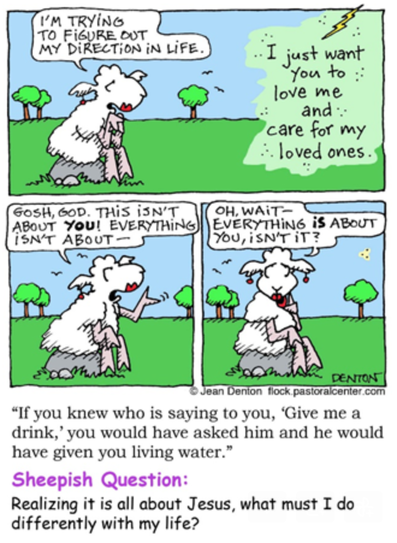

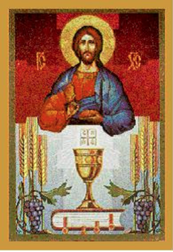
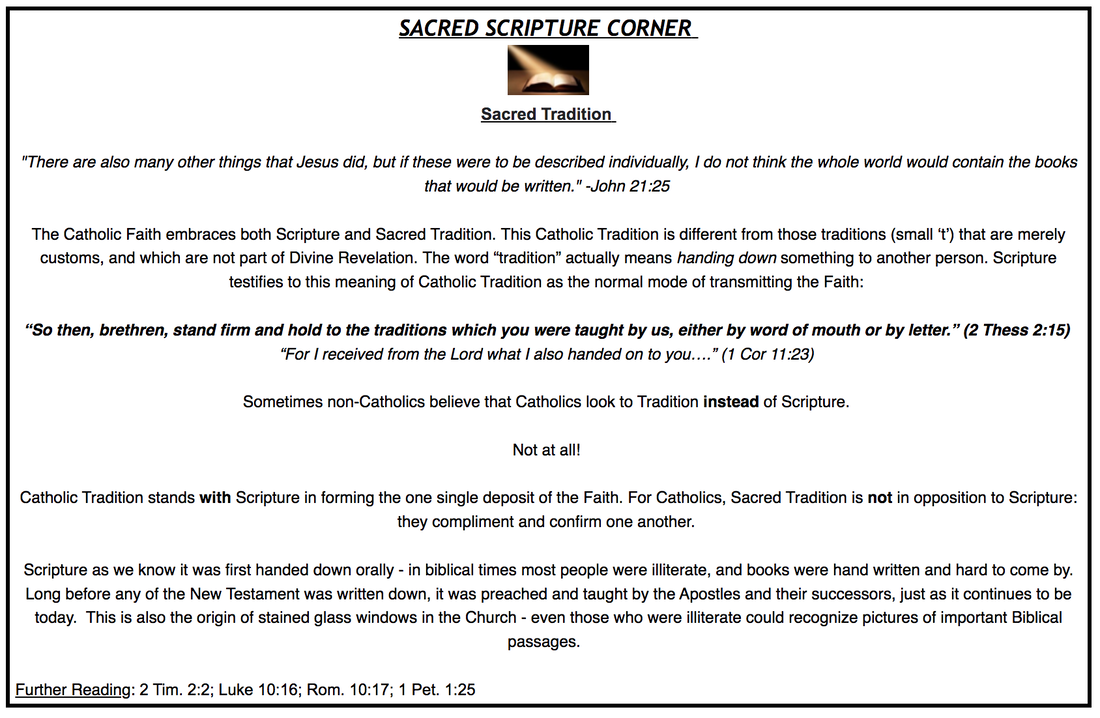

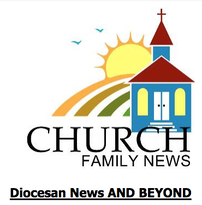
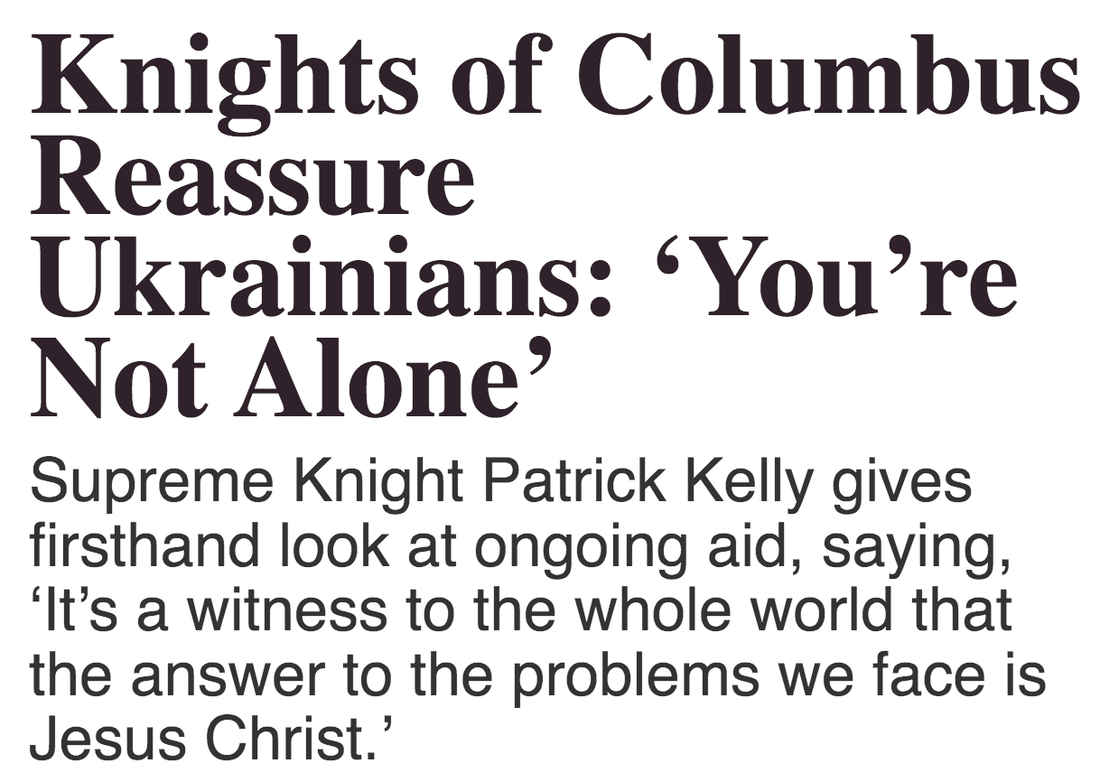
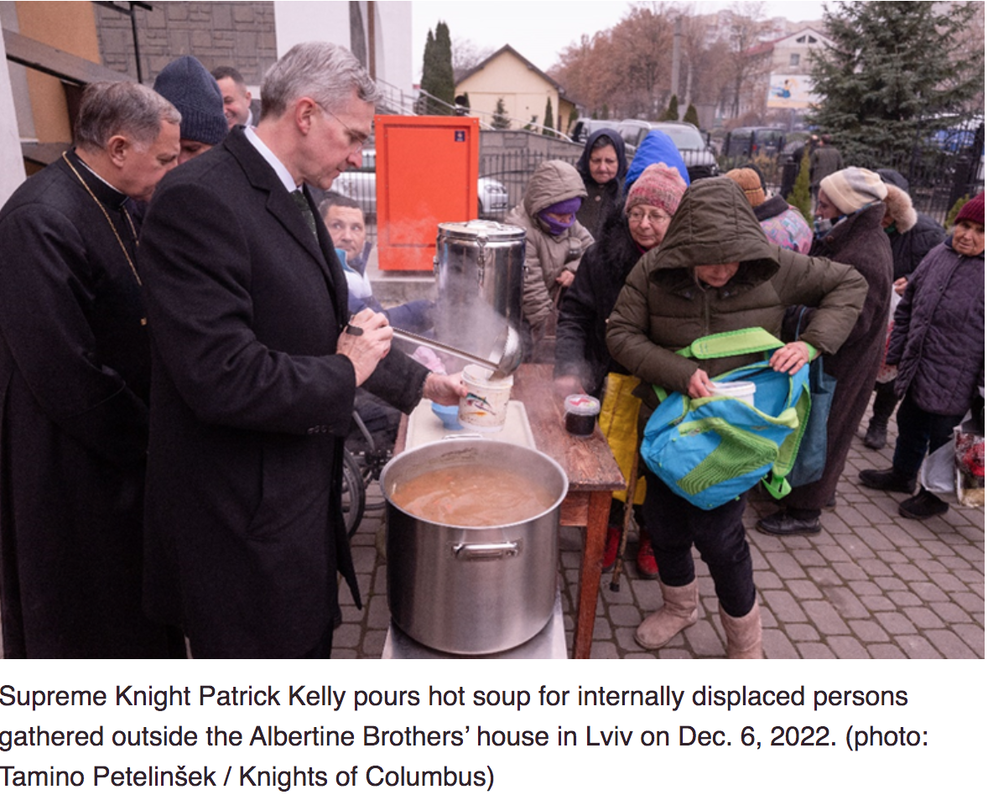
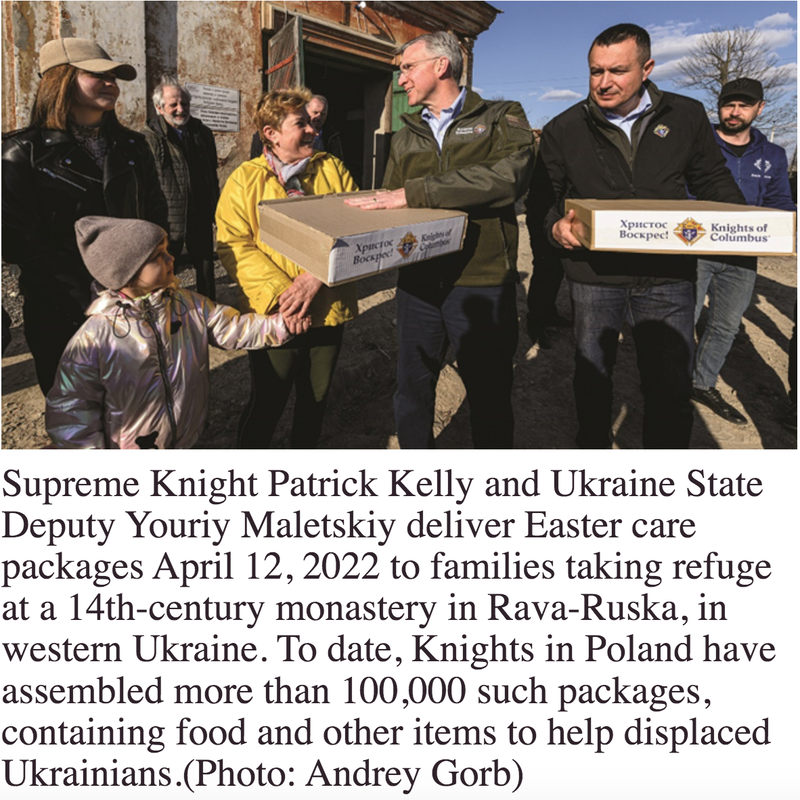
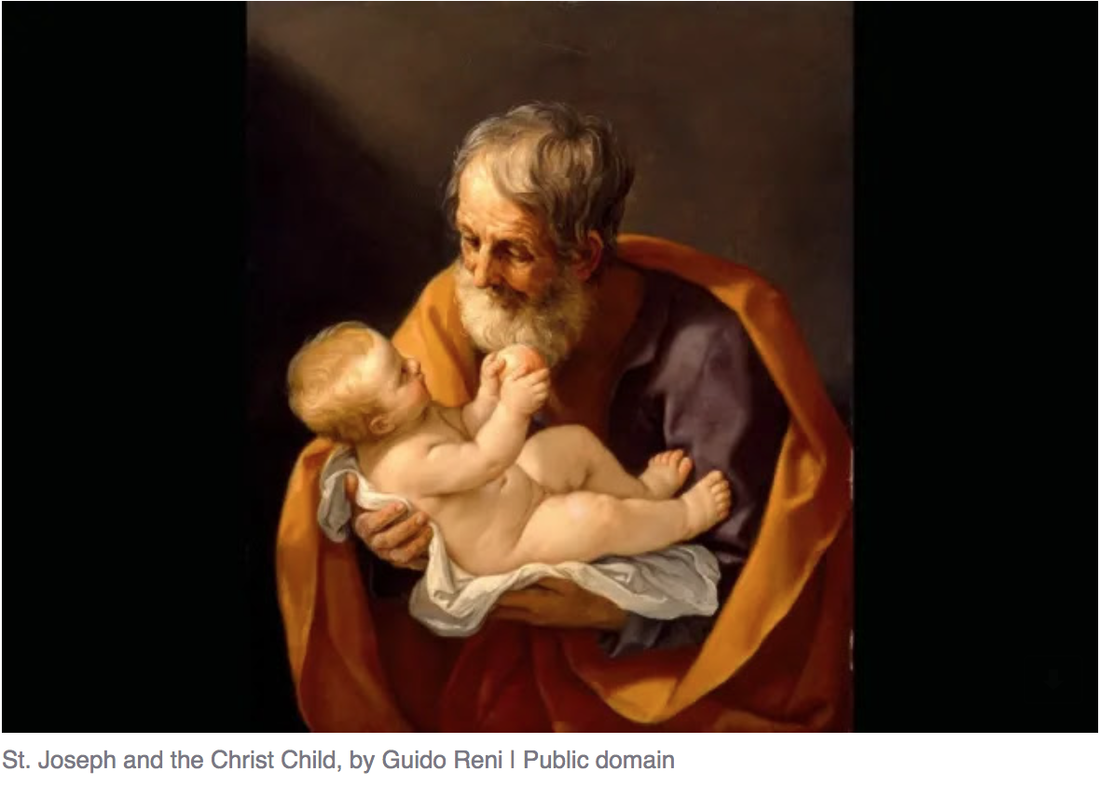

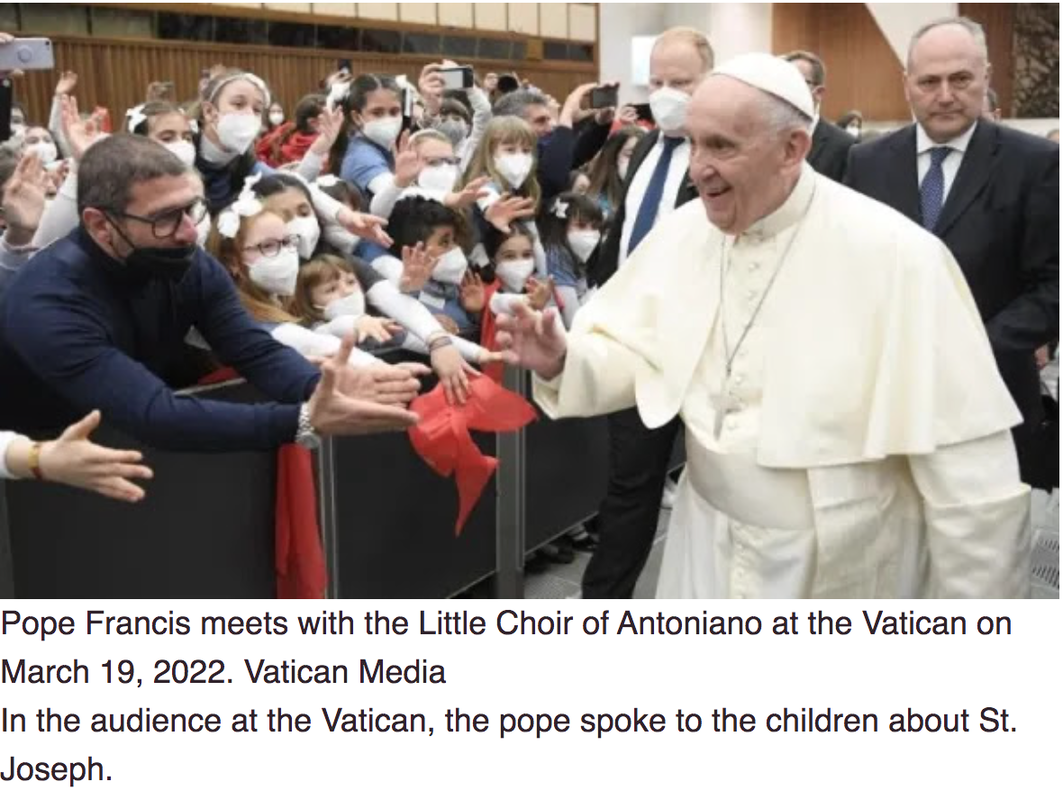
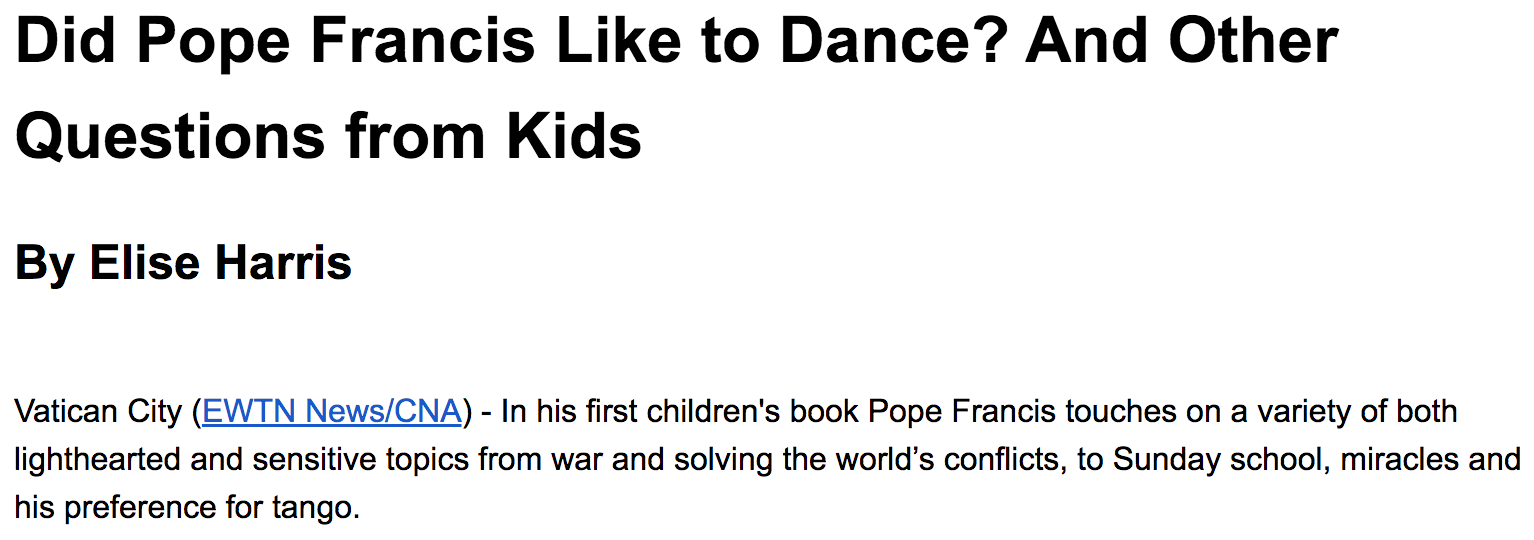


 RSS Feed
RSS Feed
